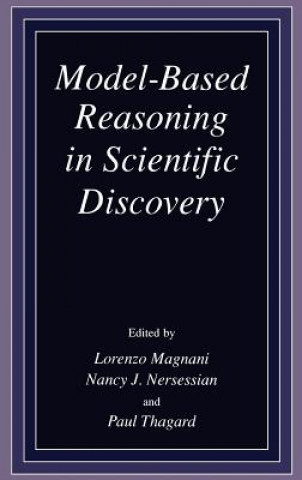
Doručenie
Nákupný poradca





Nehodí sa? Žiadny problém! U nás môžete do 30 dní vrátiť
 Darčekový poukaz
v ľubovoľnej hodnote
Darčekový poukaz
v ľubovoľnej hodnote
S darčekovým poukazom nešliapnete vedľa. Obdarovaný si za darčekový poukaz môže vybrať čokoľvek z našej ponuky.
Model-Based Reasoning in Scientific Discovery
 Angličtina
Angličtina
 862 b
862 b
30 dní na vrátenie tovaru
Mohlo by vás tiež zaujímať


The book Model-Based Reasoning in Scientific Discovery, aims to explain how specific modeling practices employed by scientists are productive methods of creative changes in science. The study of diagnostic, visual, spatial, analogical, and temporal reasoning has demonstrated that there are many ways of performing intelligent and creative reasoning which cannot be described by classical logic alone. The study of these high-level methods of reasoning is situated at the crossroads of philosophy, artificial intelligence, cognitive psychology, and logic: at the heart of cognitive science. Model based reasoning promotes conceptual change because it is effective in abstracting, generating, and integrating constraints in ways that produce novel results. There are several key ingredients common to the various forms of model-based reasoning to be considered in this presentation. The models are intended as interpretations of target physical systems, processes, phenomena, or situations. The models are retrieved or constructed on the basis of potentially satisfying salient constraints of the target domain. In the modeling process, various forms of abstraction, such as limiting case, idealization, generalization, and generic modeling are utilized. Evaluation and adaptation take place in the light of structural of structural, causal, and/or functional constraint satisfaction and enhanced understanding of the target problem is obtained through the modeling process. Simulation can be used to produce new states and enable evaluation of behaviors, constraint satisfaction, and other factors. The book also addresses some of the main aspects of the concept of abduction, connecting it to the central epistemological question of hypothesis withdrawal in science and model-based reasoning, where abductive interferences exhibit their most appealing cognitive virtues. The most recent results and achievements in the above areas are illustrated in detail by the various contributors to the work, who are among the most respected researchers in philosophy, artificial intelligence and cognitive science.
Informácie o knihe
 Angličtina
Angličtina
Kategórie




 Ako nakupovať
Ako nakupovať





























